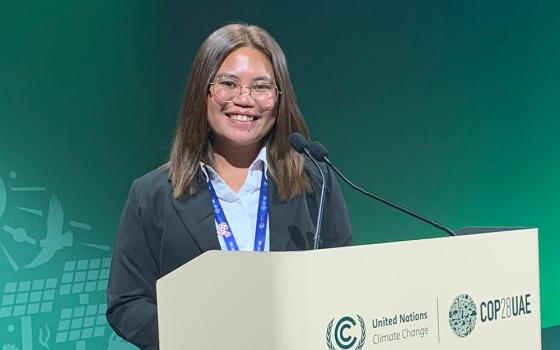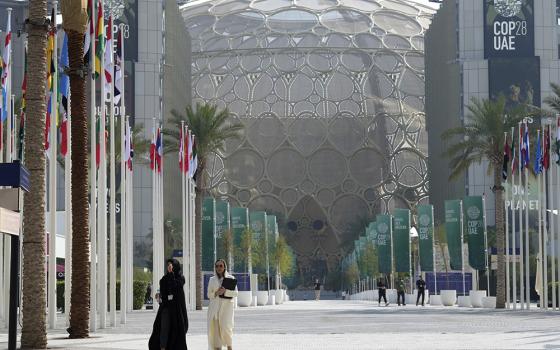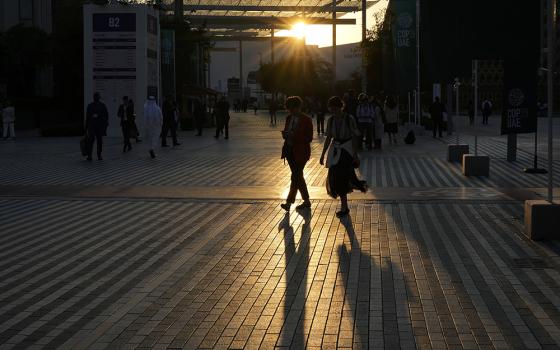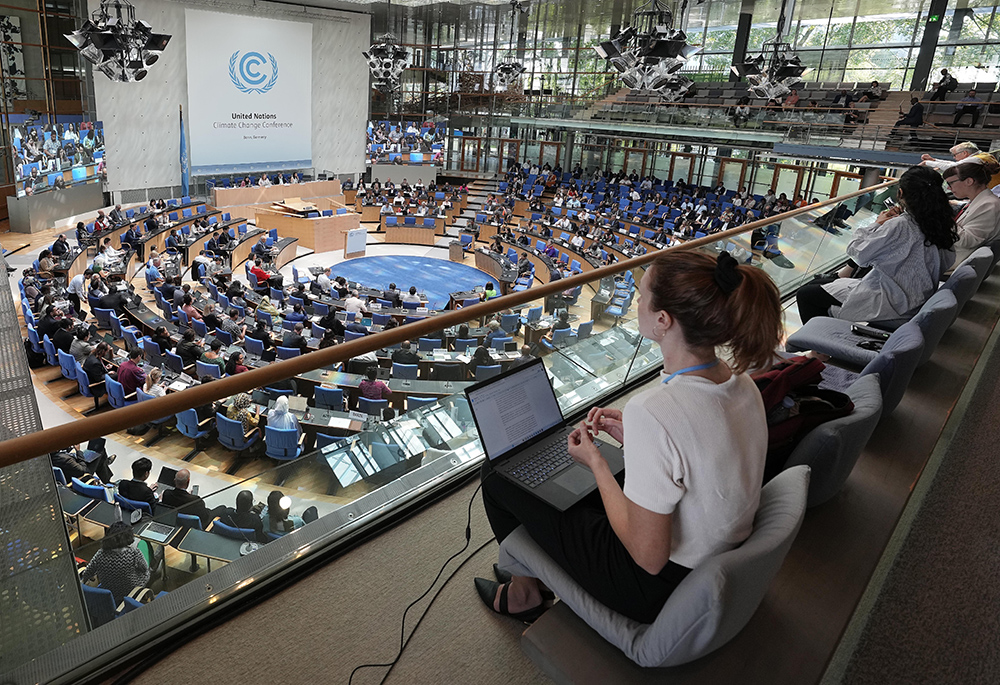
Participants meet at the U.N. climate change conference June 8 in Bonn, Germany. International climate talks at SB58 in Bonn were to prepare the COP28 climate summit in Dubai in December. (AP photo/Martin Meissner)
There is a growing demand for climate action. But that is not what the world got from the United Nations mid-year climate talks.
Instead, the United Nations Bonn Climate Change Conference held in Germany June 5-15 delivered a worrisome lack of urgency and a failure by affluent countries to recognize the plight of the poorest as they confront more climate disasters — like floods and droughts — that trigger displacement, loss of livelihoods and deeper poverty.
Many observers and party delegates were dissatisfied with the process and the outcomes.
"Countries are far off track in meeting climate promises and commitments," said U.N. Secretary-General António Guterres at a press conference on the final day of the Bonn conference. "I see a lack of ambition. A lack of trust. A lack of support. A lack of cooperation. And an abundance of problems around clarity and credibility."
The critical issue participants dealt with in Bonn was the adoption of the agenda for the U.N. climate change conference, COP28, set to take place Nov. 30-Dec. 12 in Dubai, United Arab Emirates. The agenda was only agreed upon toward the end of the Bonn conference.
Developed countries wanted to include the mitigation work program established at COP26 in Glasgow and COP27 in Sharm el-Sheikh to urgently scale up mitigation ambition and implementation in this critical decade in a manner that complements the Global Stocktake, a process for assessing progress toward meeting the goals of the Paris climate change agreement.
In March 2023, the European Union and the Environmental Integrity Group — a negotiation group consisting of six parties to the U.N. Framework Convention on Climate Change, Switzerland, South Korea, Mexico, Liechtenstein, Monaco and Georgia — requested the mitigation work program's inclusion in the meeting's provisional agendas. Most developing countries strongly opposed this, saying mitigation efforts cannot be discussed without considering finance.
The debate led the Like-Minded Developing Countries — a group that organizes itself as a block negotiator and represents more than 50% of the world's population: Algeria, Bangladesh, Bolivia, China, Cuba, Ecuador, Egypt, El Salvador, India, Indonesia, Iran, Iraq, Jordan, Kuwait, Malaysia, Mali, Nicaragua, Pakistan, Saudi Arabia, Sri Lanka, Sudan, Syria, Venezuela, and Vietnam — to propose a "counter item" on urgently scaling up financial support from developed countries.
This situation created a conundrum for decision-makers. The assessment was clear. Mitigation efforts are currently insufficient and must be substantially and swiftly increased. At the same time, developing countries want developed countries to live up to their promises of providing finance to help them adapt to climate change.
In 2009, rich countries pledged to mobilize $100 billion annually by 2020 to support climate action in developing countries. That pledge is expected to be met this year. But much of the money has been in the form of loans, which add to the debt of developing countries.
The injustice is stark. How and why should poor, highly indebted countries be expected to cover the costs of adapting to climate changes that they have done little to cause?
"It's time to wake up and step up. It's time to rebuild trust based on climate justice. It's time to accelerate the just transition to a green economy. Limiting the rise in global temperature to 1.5°C is still possible. We must consider this as a moment of hope. But it will require carbon emissions to be cut by 45 per cent by 2030," Guterres said. "The solution is clear: the world must phase out fossil fuels in a just and equitable way — moving to leave oil, coal and gas in the ground where they belong and massively boosting renewable investment in a just transition."
Despite all this, discussions on the work program on just transition pathways were seen by many delegates as fruitful, as were discussions on the Global Stocktake, which takes place every five years.
The highly anticipated first-ever stocktake is scheduled to conclude at COP28 at the end of this year. Like taking inventory, it means looking at everything related to where the world stands on climate action and support, identifying gaps and working together to chart a better course forward to accelerate climate action. It is expected to lead to more ambitious national climate action plans to align with the Paris Agreement objectives.
At Bonn, progress was also made on loss and damage fund operationalizing and funding arrangements.
Likewise, transparency measures for future U.N. Framework Convention on Climate Change events were introduced to address concerns about conflicts of interest, such as participation of observers from oil companies, like we saw at COP27.
A month in advance of the Bonn Climate Change Conference, in his latest message for the World Day of Prayer for the Care of Creation, Pope Francis exhorted us to "transform the public policies that govern our societies and shape the lives of young people today and tomorrow. Economic policies that promote scandalous wealth for a privileged few and degrading conditions for many others, spell the end of peace and justice. It is clear that the richer nations have contracted an 'ecological debt' that must be paid."
Francis also reminded us to "listen to science and institute a rapid and equitable transition to end the era of fossil fuel" as well as to all extractivist processes that destroy nature and destroy the human dignity of the most vulnerable.
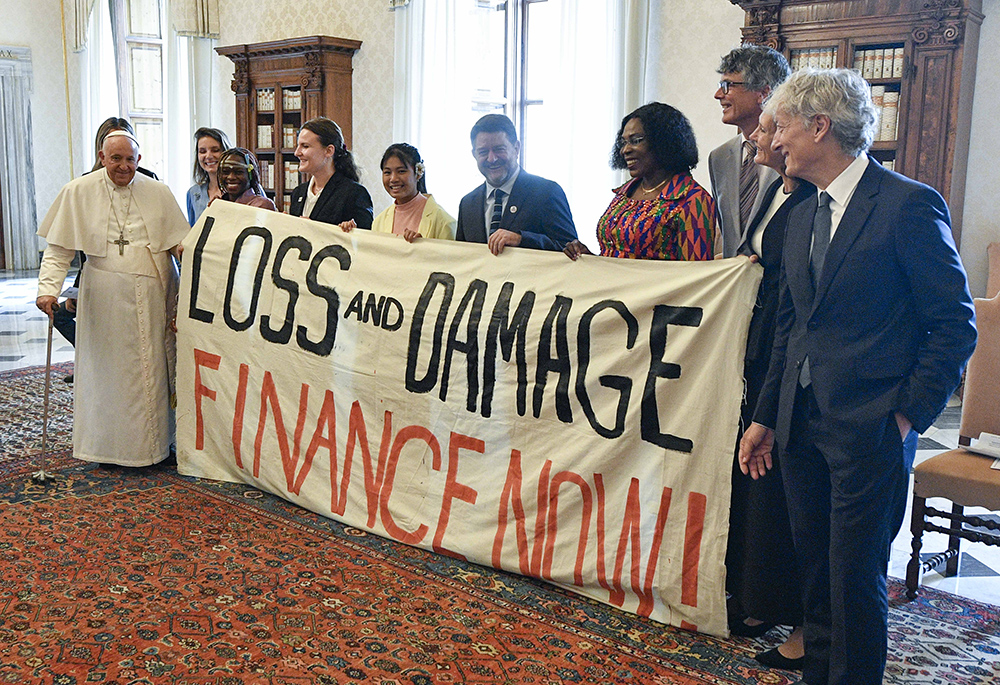
Pope Francis joins others in holding a banner during an audience June 5 at the Vatican, with the organizers of the Green & Blue Festival. The banner calls for financing a "loss and damage" fund that was agreed upon at the COP27 U.N. climate conference in 2022. The fund would seek to provide financial assistance to nations most vulnerable and impacted by the effects of climate change. (CNS/Vatican Media)
"According to the commitments undertaken in the Paris Agreement to restrain global warming, it is absurd to permit the continued exploration and expansion of fossil fuel infrastructures," said the pope.
COP28 needs to be a course correction.
At Bonn, COP28 President Sultan Ahmed al-Jaber admitted that a fossil fuel phasedown is "inevitable," but he didn't suggest a timeline. Given that al-Jaber is CEO and managing director of the Abu Dhabi National Oil Company, there are concerns from UNFCCC observers about his preparedness to be unbiased and to mediate and secure a successful and just outcome.
The Bonn conference did pave the way for ongoing discussions on funding arrangements and a loss and damage fund during the 2023 U.N. climate change conference. But as Pope Francis exhorted, we still need further agreement on a fast phaseout of all fossil fuels, an accelerated fair and just energy transition and substantial financial commitments from wealthy nations to support poor countries in tackling the climate crisis and adapting in a way that leaves no one behind.






